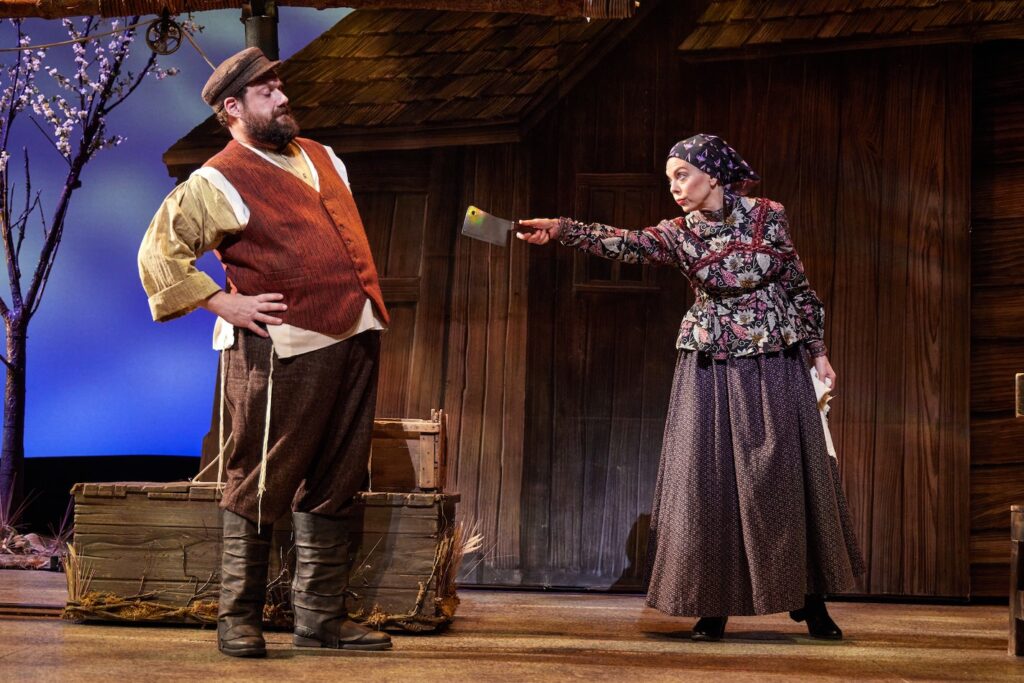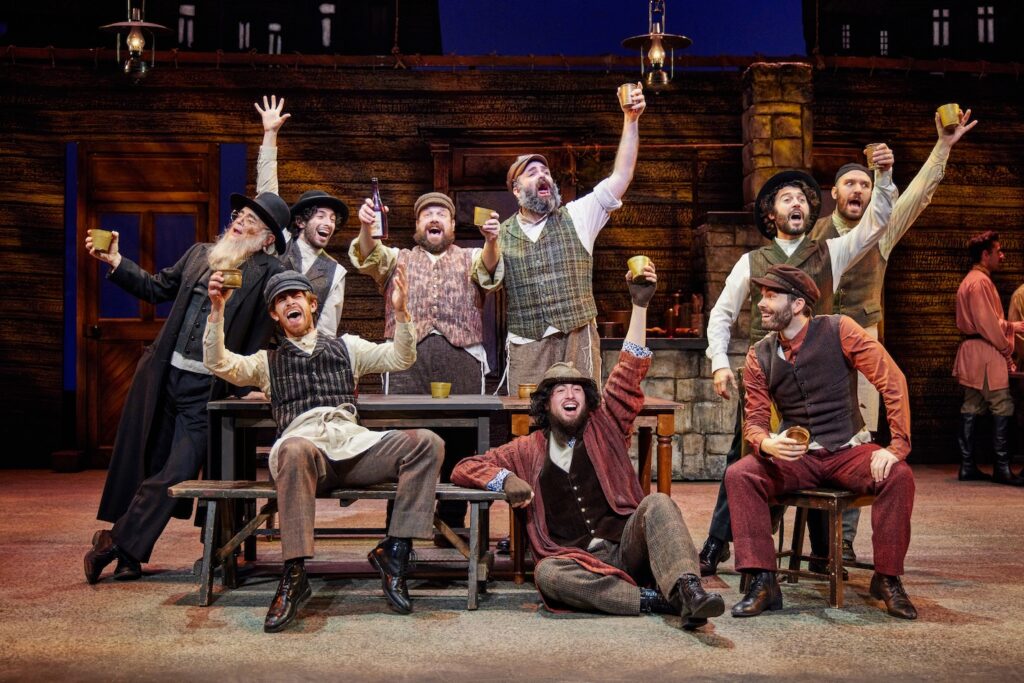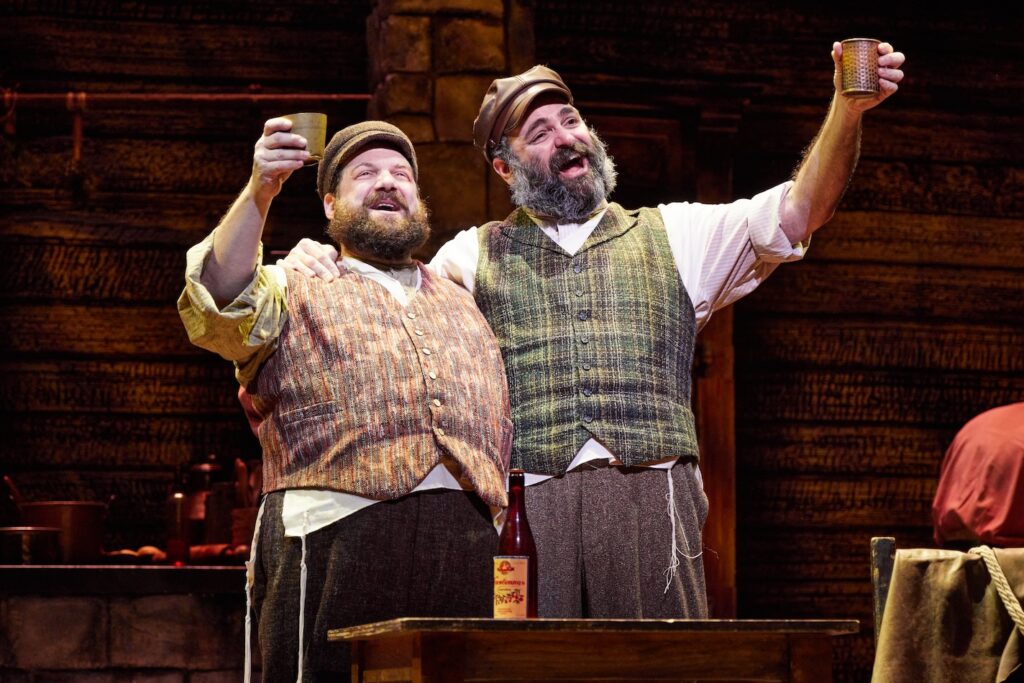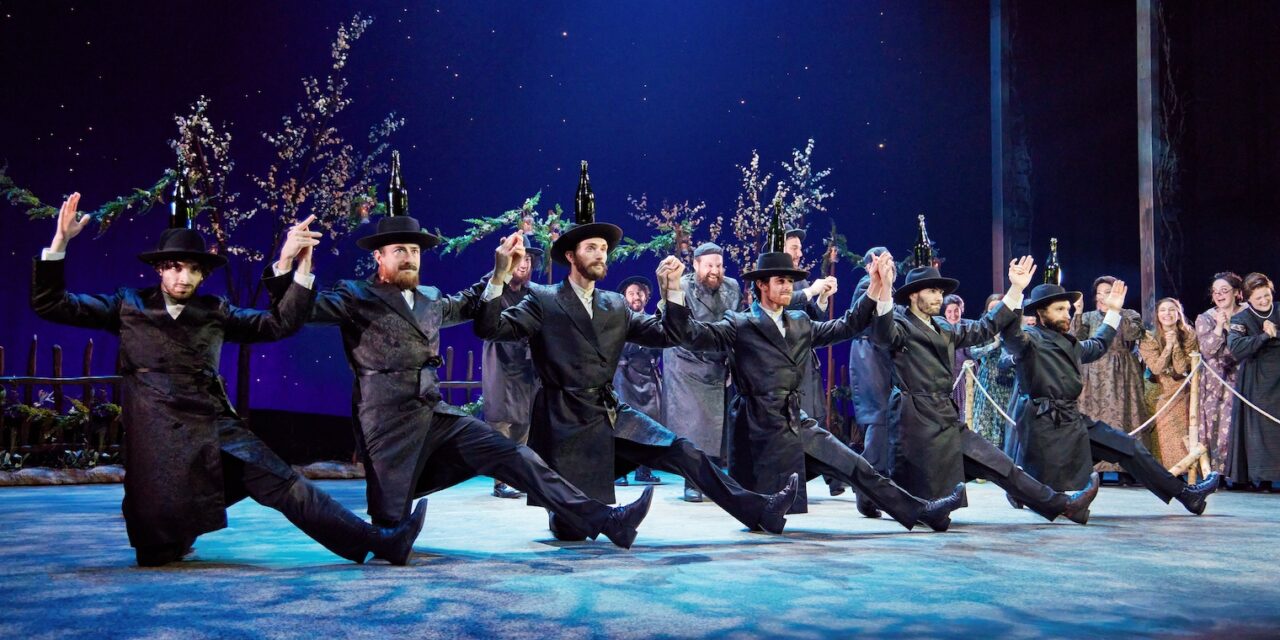Theater Review by Adam Cohen . . . .
Mazel Tov to the artistic staff at Paper Mill Playhouse for their prescient presentation of the classic musical Fiddler on the Roof. The show is the exact balm for these times. An innately and wonderfully Jewish story, Fiddler’s exploration of tradition and ritual versus modernity and change, as well as its themes of family life and everyday survival, are universal and cut across ethnic cultures and national boundaries. With immensely classic songs, performed by an immensely talented cast, Paper Mill’s production is exuberant and urgently necessary.
Since 1964, the musical about Tevye (Jordan Gelber), a Jewish milkman with five daughters who are clinging to tradition in Tsarist Russia, has charmed audiences with its humor, heart and iconic music. From the opening notes of the Fiddler on the literal roof and Tevye’s first entrance, the audience is pulled into an iconic story of love, community and loss.

In challenging periods of time, it is comforting to return to the classics. And Mark S. Hoebee’s direction is straightforward and solid. His casting instincts are spot on. Gelber brings a welcome youthfulness, snappy zeal and warmth to Tevye. He easily nails the humor and guile while offering an instant charm. He plays the tension between a very tender, loving father and a traditional man of faith with earnest vulnerability and humor. And that tone carries through the whole production. Hoebee and the cast pay abundant attention to the story’s wit, tenderness, and even fun while navigating the forthcoming turbulence. The entire cast offers a perfect combination of whimsy, depth, and humanity and the right kind of big, all-embracing voices to animate classic songs.
The breath-catching “bottle dance,” a traditional aspect of most stagings, is finely rendered. Much of Jerome Robbins’ classic choreography is intact and reproduced with finesse by Parker Esse. The dance sequences are ripe with vigor, energy, and finely honed character development.


As his daughters, Alexandra Socha, Austen Danielle Bohmer, and Maya Jacobson have the most to do as Joseph Stein’s book and Sheldon Harnick’s lyrics (with music by Jerry Bock) weave the story of their romantic journey. Each young woman is uniquely strong and exercises agency in their love story. Their stories push tradition—seeking independence from marriages arranged by Yente the Matchmaker (Suzanne Grodner)—under the backdrop of ethnic tension and forced migration. Grodner has an excellent bit of business as she and Golde (Jill Abromovitz, as Tevye’s wife) kibitz and arrange a marriage. The portrayal of the three eldest daughters keeps the women of the show from feeling two-dimensional. Socha’s Tzeitel (beautiful voice) has a definite strength and emotionality in fighting for the man she loves. Whereas Bohmer’s Hodel has a biting wit that draws her to her intelligent, progressive teacher Perchik, played by David R. Gordon.
Jacobson’s Chava acts with such kindness and vulnerability that it is genuinely heartbreaking when her father cannot support her love for the Russian gentile, Fyedka (played by Andrew Alstat). Similarly, Abromovitz brings a grounded strength to her portrayal.
The ensemble is uniformly excellent, singing with panache and grace, dancing skillfully. Paloma Maia Aisenberg, Sophie Aknin, Ari Axelrod, Ze’ev Barmor, Sabrina Brush, Michael Bullard, Mark Campbell, Will Stephan Connell, Nick Davis, Ira Denmark, Alex Dorf, Derek Ege, Carley Gilbert, Emerson Glick, Blair Goldberg, Susan J. Jacks, Michał Kołaczkowski, Kyra Leeds, Beatrice Owens, Nick Raynor, Anna Grace Rosenthal, and Price Waldman comprise this excellent core supporting cast.


Fiddler on the Roof is steeped in Jewish community and ideology. The show also portrays the pain that many Jewish people across the world experience regularly. Hoebee and the cast empathically understand the audience’s current real-life tension.
Act One concludes with the wedding of Tzeitel, Tevye’s eldest daughter, and Motel (a spectacular Etai Benson), the poor tailor she loves. The wedding is a wholly Jewish celebration that is stopped and raided by Cossacks. The Russians destroy the bride and groom’s wedding gifts and turn the ceremony space upside down. There’s a restraint to the moment, but it is still awful to bear. Perchik opposes the raid and tries to stop the destruction, and is horribly beaten by the Russians. It is an incredibly important thematic moment in the show that demonstrates the brutality the Jews of Anatevka must endure, purely out of antisemitism.
Fiddler on the Roof is definitive Broadway. In the 1960s, the Great White Way began to veer into adult territory: dark, edgy, and thought-provoking. Sondheim was in the wings, but Fiddler, with its parochial setting yet universal appeal, set the era-defining standard. It has heart, soul, fabulous dancing, excellent singing, and performances filled with a seriousness of purpose. Today and every day, it speaks to us anew.
Fiddler on the Roof. Through January 7, 2024, at the Paper Mill Playhouse (22 Brookside Drive, Millburn, New Jersey). www.papermill.org
Photos: Evan Zimmerman and Jeremy Daniel for Murphy Made (as indicated)


















